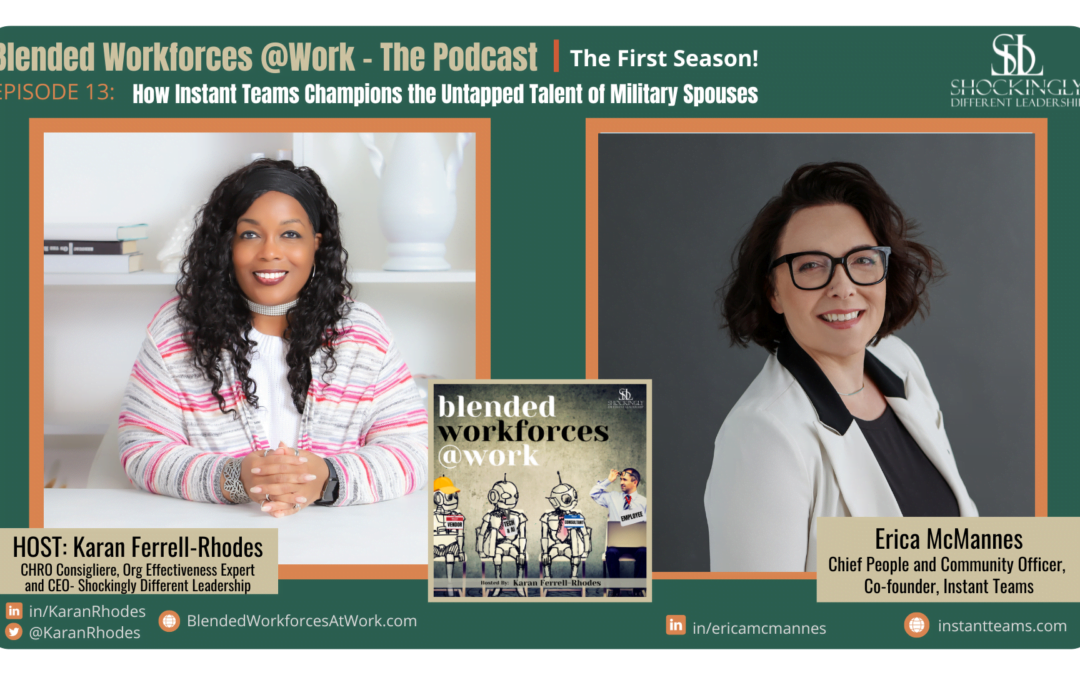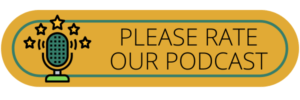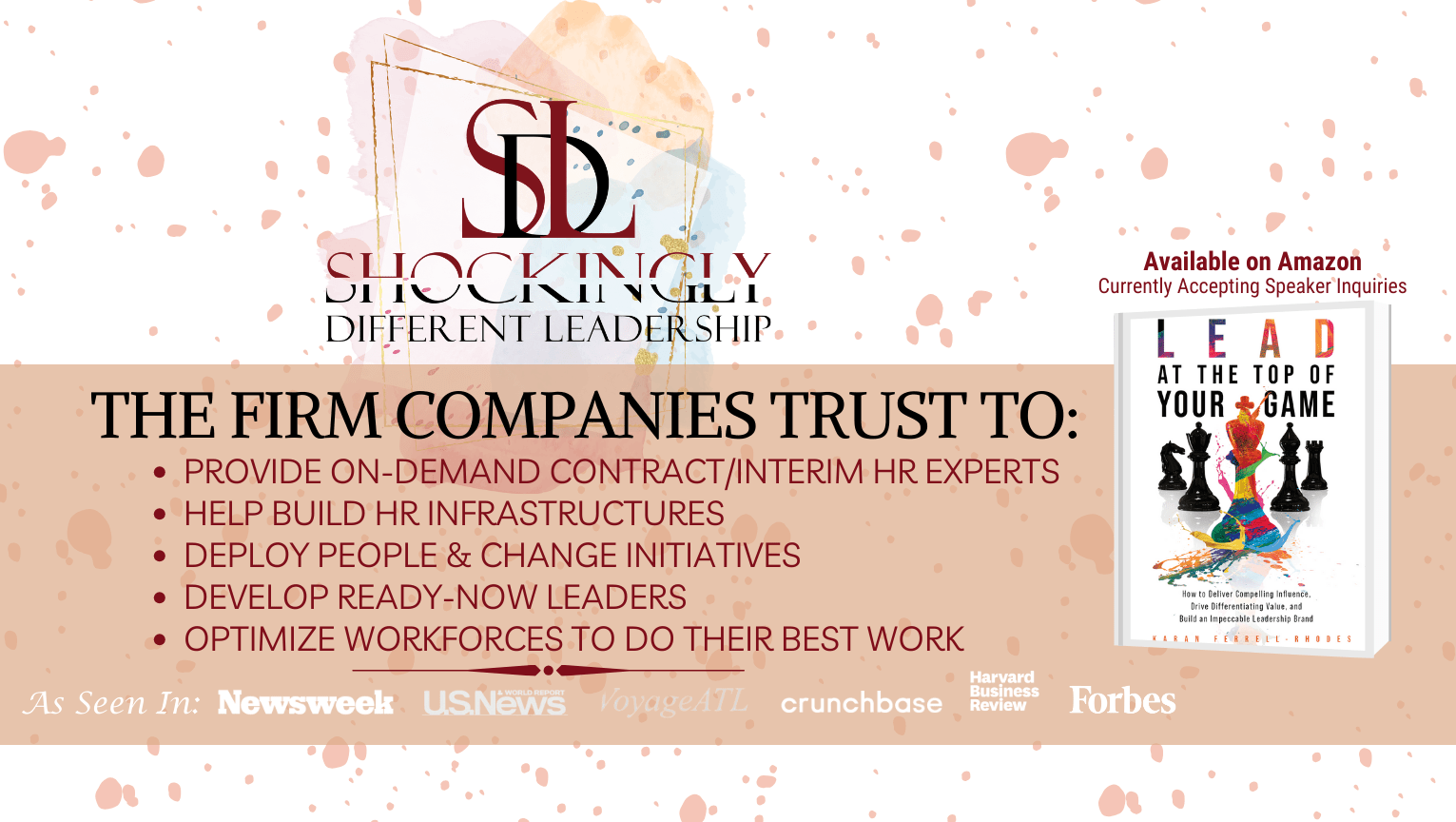IN THIS EPISODE, KARAN FERRELL-RHODES INTERVIEWS ERICA MCMANNES.
Join us as Erica shares insights into her company’s journey from startup inception to navigating the evolving landscape of remote work while highlighting the transformative impact of their inclusive hiring practices!
Erica McMannes is the co-founder and Chief People and Community Officer at Instant Teams. Instant Teams is a pioneering customer experience marketplace dedicated to sourcing exceptional diverse talent for companies while championing the empowerment and employment of military spouses through remote work opportunities. With a mission-driven approach, Erica and her team have revolutionized traditional workforce models, leveraging their innovative platform to connect skilled individuals with meaningful roles across various industries.
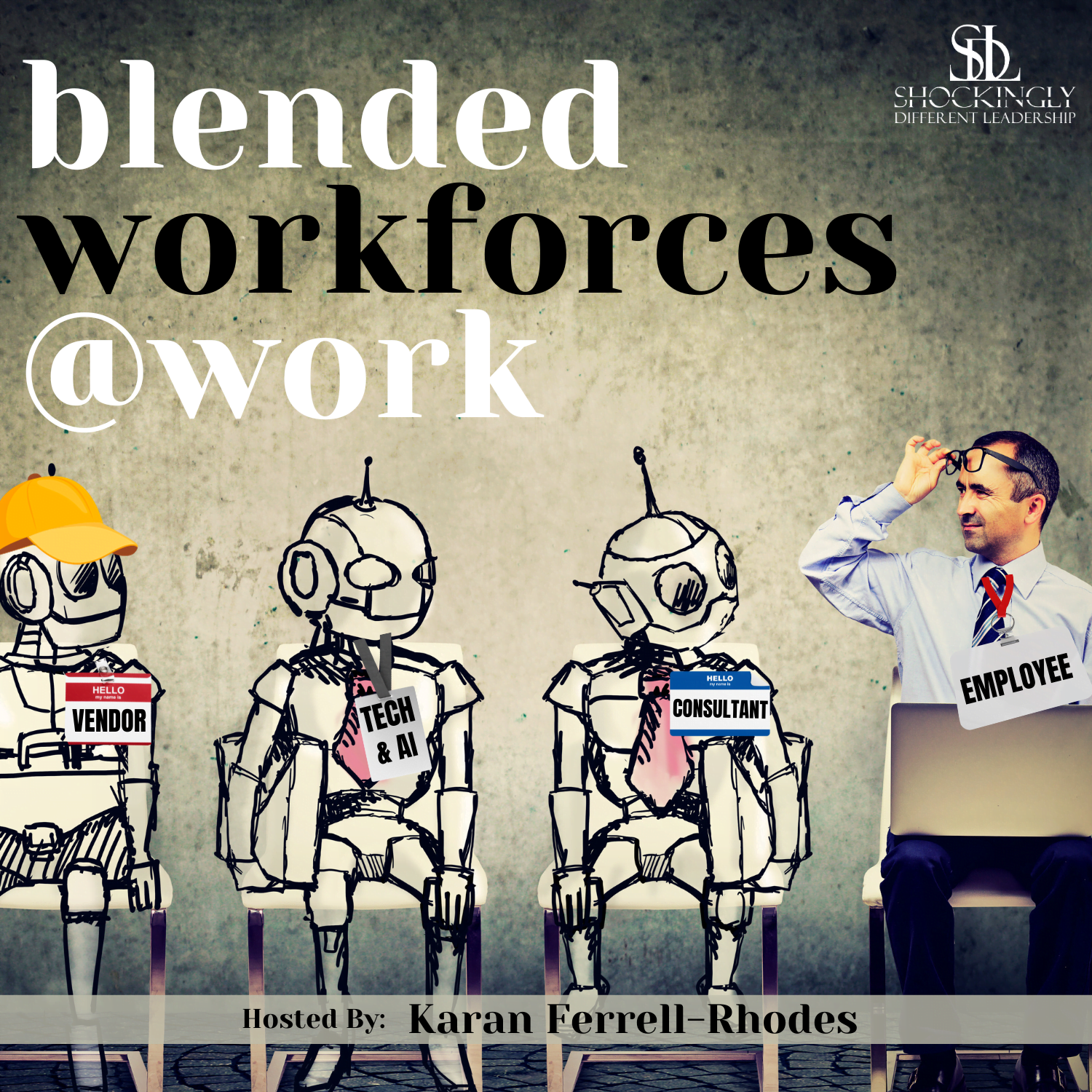
Posted by
SDL Media Team
Rather view our video podcast?

WHAT TO LISTEN FOR:
- How does Instant Teams uniquely integrate military spouses into workforces?
- What challenges does a military spouse face in building a career and personal identity?
- What strategies does the company use to convince employers to hire military spouses?
- What outcomes do blended workforces bring to organizations?
- How do the co-founders divide leadership roles within their company?
- What challenges and opportunities do military spouses face in a remote work startup?
“The access to diversity and the best talent, where talent lives, is the ‘win’ every time.”
FEATURED TIMESTAMPS:
[02:45] From Military Spouse to Co-Founder: Building a Business with Purpose
[04:18] Turning Personal Challenges into a Business Solution: The Origin Story of Instant Teams
[06:35] How Instant Teams Connects Top Remote Talent with Enterprise Needs
[08:36] Instant Teams’ Journey from Startup to Industry Leader
[11:08] How Instant Teams Leverages Diverse Talent to Meet Varied Operational Needs
[12:23] Instant Teams’ Approach to Skill-Based Hiring and Support
[14:56] Future of Work
[18:00] Insights and Strategies for Embracing the Modern Workforce
[18:52] Diversity and Flexibility in the Modern Workplace
[19:46] A Story of Leadership Realization and Growth
[21:41] How Remote Female Founders Overcame Challenges to Scale
[23:29] Empowering Military Spouses in the Global Workforce
[25:44] The Journey of a People-Centric Startup
[27:18] Signature Segment: Erica’s entry into the LATTOYG Playbook: Adapting to the Freelance Workforce
[29:33] Signature Segment: Erica’s LATTOYG Tactics of Choice: Leading with The Drive For Results

ABOUT ERICA MCMANNES:
Erica McMannes is the Founder and Chief People & Community Officer of Instant Teams and Twelve Million Plus. She has been a leader in the military community for more than two decades, holding various roles within the Department of Defense and private sector. Before starting Instant Teams, Erica was a consultant for veteran-owned startups in Silicon Valley, specializing in remote team development and management, brand distribution, and content creation.
Erica has been highlighted at HubSpot’s INBOUND Conference, Amazon’s Women in Operations Leadership Summit, SHRM’s Visionary Summit, and is a four-time presenter at the Military Influencer Conference and the Department of Defense’s Annual Military Spouse Employment Partnership Summit. Also, she has served terms on non-profit boards, including the Board of Directors for Hampton Roads Start Peninsula and the Board of Directors for Impact100 Greater Peninsula.
LINKS FOR ERICA:
- Website: instantteams.com
- LinkedIn: linkedin.com/in/ericamcmannes/
ADDITIONAL RESOURCES FOR YOU:


Episode Sponsor
SDL is the go-to firm companies trust when needing to:
- supplement their in-house HR teams with contract or interim HR experts
- implement leadership development programs that demonstrate an immediate ROI and impact on the business

Episode 13 | How Instant Teams Champions the Untapped Talent of Military Spouses with Erica McMannes
Erica McMannes 00:01
Our business model makes sense to businesses. So there’s not a lot of convincing. If there’s a conversation or a company comes to us, we have the metrics, we have the KPIs, we’ve got the great talent, like, we can show how we are making organizations better. And that icing on the cake or that, “Oh, and by the way,” there’s this incredible beautifully built in social good model and that our teams are also predominantly members of you know, the military community.
Karan Rhodes 00:01
Blended workforces are one of the hottest talent strategies today, where employers are using a mix of traditional employees with external resources like independent contractors, coaches, consultants, vendors, and technology solutions, all in order to enhance competitiveness, ensure cost flexibility, and expedite business goals. But how are the successful companies infusing blended workforces into their business strategy? And what are the critical success factors and pitfalls to avoid during implementation? And on the flip side, what does it really take for suppliers to improve their chances of finding and landing contract opportunities? The devil is in the details, my friends! I’m your host, Karan Ferrell Rhodes, and it’s time to get smarter about Blended Workforces at Work! Hello my superstars out there this is Karan and welcome to another episode of the blended workforces at work podcast. We are super thrilled to have on today’s show. Our guest is Erica McMannus, who is the co founder and chief people and community officer at Instant Teams, which is a customer experience marketplace that partners with companies to source remarkable diverse workforce talent, while empowering and employing military spouses with remote work. You know, I just knew we had to have Erica on the show because after I read about what she and her company are doing, and noting that we have a ton of service members in our personal family. I truly appreciate all that she and her teams do. And for this specialized segment of our blended workforces industry. And I just was dying to meet her talk to her better understand about her company and kind of her outlook on blended workforces, both now and in the future. So, welcome to the podcast. Erica, we’re so happy to have you.
Erica McMannes 02:05
Thank you. I’m super excited to be here today.
Karan Rhodes 02:07
Awesome, awesome. Well, you know, I have a million questions to ask. But before we even go there, we’d love to know just a tad about you personally. So just for as much as you feel comfortable. Can you give us a sneak peek into your life outside of work?
Erica McMannes 02:22
Yeah, well, like you said, my name is Erica McMannus. I’m the chief people and community officer Instant Teams and also one of the company’s co founders, my business partner, Liza Rodawald and I started the company eight years ago, which is crazy time to time flies, and then also seems to drag on him in all the ways Yeah. But I am also a military spouse. And that is really a part of the story and a part of the reason that we built the company and that we’ve remained passionate and focused on the military spouse talent community specifically, and integrating them into workforces and unique ways different ways, ways that support lifestyles, but also building that business solution for our customers. I’m a mother of two. I’ve got a 13 year old son and 18 year old son which is a whole new parenting journey into parenting young adults. So any podcast recommendations to help me up there happy happy to take recommendations, and currently living in Knoxville, Tennessee.
Karan Rhodes 03:18
Oh, what a wonderful areas beautiful in Knoxville, this awesome. Well, sounds exciting. And yes, you do have your hands full with the young adults there in this day and age trying to keep up with them, I’m sure is tremendous. But thank you so much for sharing your story and your journey thus far. So if you don’t mind, let’s just start out Erica about you know, some of the founding a little bit deeper into the founding story around the Instant Teams and just share with our members what exactly you all do and how you help military spouses.
Erica McMannes 03:55
Yea. I’ll give a quick background because I think a lot of solutions and things that entrepreneurs dive into start with, you know, your own personal why right, you saw a need and you built built something to help solve that. So as a military spouse, we’ve moved 14 times in 22 years. And so I found that very challenging to build a career and have that kind of personal career identity outside of the role of mother and military spouse and all those things that you fulfill in your life. But you know, really like Who was I and what was I contributing to what could I do and that that’s a challenge, not just for me, but there’s over 12 million military spouses out there, which people often shocked at that number, but that’s about the 600,000 active duty military spouses plus retiree veteran Goldstar National Guard and Reserve. So it’s a big, big community. And through those challenges, we ended up I had the opportunity to work for as a veteran own startup out in California. And that was after two degrees in human ecology. I was always in the family programming for the army. So very different than where I am now. But I had the opportunity to see what startups did and that you could take an idea and build a business and I along the way was building little teams for these different organizations out in California. And I was using the people I knew to build these little go to market teams, which were fellow military spouses. And so after I replicated that a few times, I was like, You know what, like, this is working well. But I, as a consultant can only do this and help so many people like, what would an actual business model look like where we could do this at scale, we could have technology supporting us. And along the way, I met a military spouse, my co founder, the CEO, Liza Rotowald. And she’s a software engineer. So she’s got that technology. She’s got that vision. She’s got the CEO, you know, mindset. And so we just kind of had a heart to heart like, hey, we both have seen these problems, what can we do to solve it? And after that conversation, like a week later, we were like, We’re all in let’s start this thing. And that was almost eight years ago to the date. ,
Karan Rhodes 05:51
Wow! You blink. And it’s eight years later, right?
Erica McMannes 05:54
A lot of lessons and scars and celebrations along the way.
Karan Rhodes 05:58
But yes. Wonderful. So can you tell our listeners a little bit more about how you work with the military spouses and how you work with companies and make matches or provide other types of support?
Erica McMannes 06:11
Yeah, so as a marketplace, like you mentioned, we’re serving two sides of the equation and being able to bring them together for success. So on the b2b side, we have our customers, which are middle market, enterprise level organizations who have you know, any of those stages of the customer experience journey, whether it’s customer support, customer success, like all those different stages, were able to come in with our model, which is 100%, remote, and kind of support in one of two ways. So one is a full BPO model. So those organizations come to us and say, Hey, I need a team of 20 to fulfill this specific role. Or we’re expanding and we need, you know, 20 new people. And we go into our talent community, which we have about 60,000 individuals who are like signed up looking for work, we’ve built community around that as well. And we’re able to build that team for them. And we execute it, we do collaborative training, that we plug in place so that those organizations are getting the best of the best and this amazing remote team, but we’re taking care of all of that for them in the day to day. Or we can build direct hire pipeline. So a lot of organizations, especially, especially post COVID, you know, are just looking for great talent and a remote capacity. And so with that same talent pool, we’re able to build those pipelines and give you if they’re a smaller businesses, they might not need a team of 20 to 200, they might need one or two. And so we’re able to support them in more of that direct hire way.
Karan Rhodes 07:32
Wonderful. In our pre talk I had shared with you when I was working at Microsoft, we had a special initiative that we started around supporting military service people transitions out of the military as well as separate divisions to focus on spouses since we you know, we had offices all over the world. And it’s continuing to this day, one of my very close friends is still part of that team who supports them. So I’m just curious, how do you all reach out to companies or find companies that are very open to this unique workforce? And how do you convince them to come on board and, and give your spouse’s a chance?
Erica McMannes 08:13
Yeah, I mean, that has evolved over the years, right? We’re a startup. So from year one to year eight, we’ve we’ve learned a lot and we’ve pivoted, and we’ve changed. I mean, in those early days, it was, you know, word of mouth and referrals. And very honestly, that still is our strongest core. Like we’re relationship builders. We believe in you know, that good business comes from knowing people and supporting people and having not only that transactional interaction, but that relationship. And so that continues to help us grow. And scale is that word of mouth. But over the years, we’ve also built, you know, a full sales team, a full sales engine. So we do use a lot of, you know, traditional tactics, but with our own kind of creative relationship building, you know, techniques built in there to continue to build pipelines and reach out to new companies and organizations, the needs base has changed in a way, whereas we started in 2016. Not a lot of people were super remote friendly. There’s always been remote companies. But that wasn’t a claim to fame, or what companies were looking for. And it was more of a convincing model, right? We had to convince people, we had to explain what remote work was why we were trying to do this. And then boom, 2020 hit, and we’d already been doing it for four years. And people were like, oh, okay, this is making sense now, which was an interesting space and time for us to show up with what we knew how to do and how to support these organizations, and individuals and, you know, major crisis situations. And so it’s been really fun to see that model change. And now, our business model makes sense to businesses. So there’s not a lot of convincing if there’s a conversation or a company comes to us. We have the metrics, we have the KPIs, we’ve got the great talent like we can show how we are making organizations better. And that icing on the cake are that Oh, and by the way, there’s this incredible beautifully built in social good model and that our teams are also predominantly members of you know, the military Community, which then allows military families to be dual income and have, you know, additional economic impact into the military community. So it’s, it’s not easy, right? Business is hard, but there’s always these great win win wins. That happened in those conversations.
Karan Rhodes 10:15
It is, and it is, I’m here with you. We have the same exact model here at SDL. Except we focus on the HR community versus, you know, just the military community. But the social good aspect does resonate probably a lot with your individuals, I can definitely see the how that helps open doors, if you will, for those that are they’re open to them. And who is your primary target market on the company side of the house? Is? Is your talent acquisition leaders? Or is it your business leaders or a mix?
Erica McMannes 10:45
It’s a mix predominantly. So we’re kind of industry agnostic, meaning if it’s the right type of team, we have insurer tech, FinTech, cybersecurity, retail e commerce. So we have a lot of different industries we work in, which is great, because military spouses have very diverse backgrounds and skill set. So that works for us. But our targets are our buyers are like those initial relationship builders are often like head of operations, they might be CEO introductions toward them are handed down into an organization to say, hey, this makes sense, have conversations, but very embedded in that operational sides of the house, some HR just depending on if they are, you know, keeping all the RECs inside and they’re not looking to outsource, but organizations who have big outsourcing arms, or do that in the day to day, those can be great ins for us as well
Karan Rhodes 11:31
Makes a lot of sense. And I’m curious on the the spouses side of the house, I know there’s different levels of readiness for this type of work. How do you find? Or do you do anything to help the spouses get ready to be a member of an external workforce for a company? Or do you find them pretty knowledgeable and ready to go already and don’t need a ton of onboarding except for what the company does?
Erica McMannes 11:59
Yeah, it’s definitely a mix. So you know, I mentioned the number like it’s a very large community. And so people are coming from all walks of life, all genders, all races, all ethnicity, all backgrounds, experiences. And so you’ve got just this very diverse group of people who some are ready to, like pop into the workforce, and some aren’t, we have a lot of community partners. So if they’re not ready, and they need just some professional coaching or readiness, like we have, you know, other nonprofits are organizations that we work with, to help people more on that readiness side. But where we really find our wins is that we are we do skill based hiring and matching versus chronological resume or traditional resumes. Because oftentimes, the military spouses life looks a little messy, if you try to put it on paper and compare it into like, what a traditional corporate, you know, recruiter would be like, Yes, this is it. So we’ve been really careful to be sure that as we’re building this, we’re also cognizant that, you know, the skill sets of military spouses and how that looks on paper might not look normal or traditional to, you know, an organization. Yeah, so staying on the forefront of that, and being able to also help people translate. So some of my favorite stories are like, there’s a lot of spouses who are teachers or nurses, because traditionally, those have been good transient jobs, if you’re moving every two to three years. And some people are exhausted by that some people aren’t tired, because COVID people are looking for different outlets. And we have ad tech or health tech customers who have been able to take those baseline skill sets of those teachers or nurses teach them, you know, on a technology platform, and so they’re now supporting the customers customers through whether it’s an education platform or onboarding, an intake through, you know, like a health care or health care platform. So those are really fun success stories to see that translation and really, you know, proliferation of that blended workforce and being able to bring people back in in different ways.
Karan Rhodes 13:52
Absolutely. I can only imagine. I’m curious about…I’m gonna take it up a notch in general, of all your experience over these eight years plus, in your opinion, what is the power that blended workforces bring to organizations and and the vendors or suppliers that are consultants that are in the economy? Take that back? I’m talking over myself here. What is the power of potential power, blended workforces? And then what are some obstacles or things that companies need to keep in mind when they’re considering a more expansive blended workforces strategy?
Erica McMannes 14:33
It sounds very cliche, but the access to diversity in the best talent where talent lives, I mean, it’s the win every time and the biggest concern I see still, even as a four years into kind of this future of the workforce and remote work and all of this push and pull on like return to office and everything that you still see happening in the day to day is it’s forcing people into a model or trying to force people back into a model that people have been and set free, right? There’s not I’m a firm believer in that. And the more that people try to force that, the more they’re going to become disconnected from great talent from the modern workforce from scaling and moving their organizations forward. Even very large dominant brands who’ve been around for 45 years, like, you can start to see like little cracks in branding, or in how employees or career seekers are talking about those brands. Because they’re just, they’re not looking to make a change, and they’re not looking to mold and move with the workforce, which is very risky. In my perspective, as a business, I love the humanity that has happened, right? Letting people be people and seeing that people exist, you know, I’ve got kids and a dog outside the store. That’s okay, like, a lot of us do, we don’t have to be these very different masked individuals in a work setting to still be highly professional, highly successful, highly productive. So it’s an exciting time, I think, to be in this space and hearing these conversations and seeing that change in time, in real time. Somebody asked me, right, kind of after COVID happened, like, well, you know, people were like, how do we how do we change the remote? How do we build this? Who who builds this for us? And I said, you have to have somebody who likes it, build it. And I think that’s the problem, as a lot of organizations, they have somebody in charge of what the workforce is doing, who does not want to adopt change, they don’t want to adopt the fresh opportunity that’s at hand. So yeah, I could go on and on I’ll stop there.
Karan Rhodes 16:33
No, you and I are thinking alike. And you know, one of the things that, you know, we do at SDL, we help companies with their blended Workforce Strategy, but you’re spot on, you have to have someone that is passionate about it, that loves it that’s interested in it. And that knows their business very well, as well. And I always tell them, when we go in for consulting, it’s not really rocket science to infuse, blended workforces into your overall people or workforce strategies. You just have to be open to thinking outside the box and rethinking how work gets done and being open to that. Because once you do, so you have a different lens of knowing what really, truly has to stay internal, versus what doesn’t. And then that brings a lot of cost, agility and talent, agility, you know, into the business. But you’ve got to be patient and do the due diligence upfront to rethink your workflows. Do you agree? I feel free to throw tomatoes at that, you know,
Erica McMannes 17:37
Yeah, no, I totally agree. I think there’s risk and not adopting or really just being realistic that no matter how much an organization wants to stay the same, you can’t mandate that if an entire multiple generations of a workforce is saying no, we’re going a different way. So I think you guys are in a unique place to where you’re helping people think that through are giving those tips and tricks, tips and tricks on how to actually make that work.
Karan Rhodes 18:03
We’re trying but there’s still an educational component. I mean, people are a lot more open to learn to work versus now as you’ve mentioned, but there’s still deeply an educational component to help them re envision what’s possible. And then once you kind of plant that see, then that’s when they start to, you know, be more and more open to Okay, let’s think about this a lot more strategically, and how that can impact our business.
Erica McMannes 18:28
Yeah, it’s definitely a mindset. I think sometimes it comes to like the individuals in leadership or the people making those decisions. And that Why didn’t work that way. Or that’s not how I got to where I was, which we can look historically to see how much damage that mindset has done and multiple ways. But it’s an exciting time, I think, you know, women in the workforce opportunities, people with disabilities in the workforce having an opportunity, right, whether it’s it’s hybrid, or it’s fully remote, or it’s a little back and forth, if you really love that introverts and extroverts being able to figure out where they belong, and like, their flow space and how you know, they can be more productive with that flexibility. I think it’s super exciting. I’m excited to be on the the actively thinking about it side of the house.
Karan Rhodes 19:13
Me too! It’s a fun place to be right.
Erica McMannes 19:17
It is.
Karan Rhodes 19:17
I’m just curious, how do you and your partner split up duties and leading the company?
Erica McMannes 19:22
Yeah, it’s an interesting question with I’ll give a short backstory and that like traditional founders, like you’ve got an idea that you there’s two of you, you kind of just choose a title day one, like, we’ll all be this, and you’ll be this and that’s what we’ll be. And so when we did that, originally, I started out with the CEO title because it had kind of been my idea. And I brought it to her. And since she was a software engineer, she was the Chief Technology Officer. And that made sense for about maybe the first nine to 12 months to where we ended up in a personality assessment, testing consults. Yeah, and our results came that we were in like for the future you know, sanctity of the company. We were in very wrong roles. And we’ve always been very strong co partners, co founders, ego does not get you anywhere. So hey, what am I doing wrong? What are you doing wrong? Like, what do we need to do to make this work. And so when we left with those results were like, we got it, we got to flip this, like you, our CEO material, the way you think the way you connect the way you drive, and I’m more of the process builder and the people operations, you know, the back end of getting the people to follow that vision and build the path to that. And that was really powerful for us, because I have…100%, like that switch has allowed us to grow and continue to scale. I mean, she functions very much in that CEO role, vision of the company strategy, the company sales, Investor Relations, and then I spent a lot of time on the community marketing and HR people operations side of the house.
Karan Rhodes 19:59
Ahhh…Interesting, That’s amazing. I mean, if you’ve had, if I can say a uniquely successful aspect of your founding of the company is getting financial investment. And it’s really very hard, as we all know, for women founders, and I imagine that’s what helped you expand from a small group to what over 500 employees now, can you share a little bit more about that journey of how you all were able to scale? And what was it like to pitch and finally get investment?
Erica McMannes 21:17
Yeah, I mean, the the funding is, its fuel, right? Like, when you when you’re building an organization, you can build in many various capacities, but we knew to get ahead of the market. And to make the biggest impact, like we were going to have to give up some of our company in order to take an investment. And so also a very unique space to be in one as female founders, like you mentioned, yeah, to the fact that we were 100% remote. So this was 2016 2017. And you know, the that space was very, kind of almost built and operated for very male dominated environment who did not have potentially parental duties on the back end. You know, also as military spouses, we have very unpredictable family dynamics and schedules. And I mean, we were basically told when we first brought the idea of like, Hey, I think this is the path we want to go down, that we wouldn’t be able to do it because we couldn’t go out on the road for you know, a road show and travel the United States and pitch it all these different VC firms. And as you probably know that the best way to tell somebody to be successful is to tell them, they can’t do it. I’m sure we can do this. And so we invested time into the network building. So as military spouses, we didn’t have access to friends and family like most people say, you know, you have to do a friends and family round before you can go Angel and grow and right. Our friends and family weren’t in financial positions to put in several $100,000. So again, alright, what how are we going to make this work? So we invest in time and like accelerators and incubators, programs that had networks to build relationships with people and understand like, how to do it and who to talk to. But, yeah, then we did an angel round a Series C in a Series A all 100% remote and
Karan Rhodes 23:01
Oh! Amazing.
Erica McMannes 23:03
It is,
Karan Rhodes 23:03
Congratulations!
Erica McMannes 23:05
Thank you. A lot of credit to Liza, she, you know, as the CEO, she did most of the pitchy she was on that front end. But really cool experience again, just to kind of prove like, don’t let somebody tell you, you can’t do it. If you’re super passionate about it. You just have to find the right people who are also passionate in what you’re passionate in. And it’s a big world out there that there is opportunity and access.
Karan Rhodes 23:26
Absolutely. Now, do you just help spouses? Or do you help service members as they transition as well.
Erica McMannes 23:35
So as a for profit, private organization, we all fair hiring, you know, compliance laws. So, good news to your HR ears, I’m
Karan Rhodes 23:43
Yes! Very much so!
Erica McMannes 23:45
Our brand is very focused on the military talent committee. Like that’s our mission. That’s where we drive but we hire if you are qualified for a position you apply in our selected we hire anybody. So we have military spouses, we have veterans, we have a lot of non military affiliated team members as well. So it’s a really cool, like, also very diverse group within our organization. But we do always drive that the opportunities that we’re bringing in that we are able to put military spouses in those jobs.
Karan Rhodes 24:11
Oh. Ok. And I’m just curious, does it skew more female than male?
Erica McMannes 24:18
It does about 90%. Female. We actually just finished our recent annual AAP review. And, you know, she’s always like, you guys are doing great. You’re 90% female, which they don’t see very often. So. And again, I think that’s, you know, an indication of a different reimagined way of working allows opportunity for people to put that you know, into a way that works for them within their lifestyle. So yes, very, very female dominant.
Karan Rhodes 24:50
Very cool. And are your members global are mostly in the US base
Erica McMannes 24:55
mostly in the US but because military spouses can be stationed overseas or in different locations, we do have some team members who are in the military. Oh, CONUS. So overseas, but predominantly our teams are US based.
Karan Rhodes 25:09
So what keeps you up at night? What is it that either keeps you up currently? Of how you all want to improve the business? Or where what keeps you up about where you want to grow in the future?
Erica McMannes 25:21
Yeah, I think two things come to mind. I mean, one like this is a very interesting time to be one, a startup in just this economy, and then a startup who’s focused on people as their product and a changing workforce. So
Karan Rhodes 25:35
Yeah,
Erica McMannes 25:36
It’s difficult, right? And then there’s all kinds of new, you know, federal regulations around employment
Karan Rhodes 25:42
Every day, something new.
Erica McMannes 25:43
And keeping up with that, and 50 states, and we’re an HR team of four, like, so that is a lot, right? There’s a lot of constant. How are we doing? What do we need to do? How do we stay on top of this, but I think that’s typical, right? Running an operation, you got to be sure you’re on the up and up.
Karan Rhodes 25:59
That’s right.
Erica McMannes 25:59
But what keeps me up at night. But what gets me out of bed in the morning is is that we still have so much work to do. Like we’ve built over the eight years, we’ve hired hundreds of military spouses put 1000s of people in positions, but there’s so much opportunity. And when you just you see that, like it’s almost that like good anxiety of like, okay, how like, we got to keep doing this, like we’ve got to keep building, there’s so many people and opportunities that we can make happen with with how we’ve put together how to solve this problem. So Good, the Bad and the Ugly anxieties in there kind of rotate through hour by hour.
Karan Rhodes 26:33
No, I totally get it. I totally get it. And if you don’t mind sharing, and if you don’t want to is totally fine. Is your business model, like a percentage of their fees, you’ll get to help fund the company? Or is there something on top that companies have to pay? I mean, how do you all stay afloat?
Erica McMannes 26:55
Yeah, so for a military spouse, or anybody who’s looking to be employed, 100% free, so we don’t charge anything on that side. But our model is billable to whatever work is being done on the customer side. So that takes shape differently depending on the need of the team and the type, whether it’s that direct hire or kind of that fully outsourced model, but definitely billable hourly model based on the work that needs to be done.
Karan Rhodes 27:17
Wonderful. Gosh time has flown in this area. Oh, we’re about running out of time. I have a couple more questions, though, for you. Before we let you go. If there was one piece of advice that you would love to lend to a military spouse that is considering signing up in your platform, what would it be?
Erica McMannes 27:39
Yeah, I think it would be to like, let the noise of oh my gosh, I’ve done so many things. I don’t know, like how to put this together, go. And to strip that down to the skill set? Like what are the things you can do? What are you good at and really lead with that it comes down to, you know, selling yourself in a way where the individual sees it. So having examples and being able to really show and kind of debunk a myth that might come with somebody seeing you as a military spouse professional. It’s just focus on the skills.
Karan Rhodes 28:10
Wonderful focus on the skills, ladies and gentlemen. All right, our final question for you. As you know, we did a significant research study on high performing leaders and I actually wrote a book on the findings. And so we always are passionate about promoting tips on how people can be a better leader no matter what role your role in no matter whether you’re inside or outside of a formal company. But we’d love to ask our guests which of the top seven tactics that we write about that came out the research really resonated with you, and you were so kind to share that leading with a drive for results kind of piqued your ears, if you will of it. And for our audience, listeners, leading with a drive for results is all about being very persistent and tenacious about making sure your goals are achieved no matter if you have to pivot along the way. So curious minds want to know, Miss Erica, why did leading with a drive for results really resonate with you?
Erica McMannes 29:10
I think at my core, it’s the entrepreneurship spirit in me, right? Like in order to build and grow, you have to have results. Like if you’re not seeing results, then you have to change or you will not have a company. That’s right. And the drive for that is that our scale and growth involves people, right? We don’t have a product that just comes off an assembly line and like okay, well if it’s not working, okay, right. There’s a lot of drive and results that have to happen in order to make this organization grow. So there’s very deep tactical pieces of that from a process orientation as a remote organization, like how do you put the goals forward and know that people are hitting those and of course, there’s, you know, performance, you know, involved in that from an HR perspective. But there’s also just communication and I think at that front end of driving results for me has always been Do people understand where we’re going? Do people understand what’s expected of them? Can they come to you when they don’t? Right? Like, there, that layer has to be gone, you can’t get results if people are afraid of trying things to get to those results. So and then that investment, you know, that we mentioned, we have to show results, like we have to show and we have to prove that we are making the right decisions to grow an organization. So a lot of results driven strategy in my brain at all times.
Karan Rhodes 30:26
I can imagine, well, thank you for sharing that perspective. Well, you know, we’re gonna have all information about you and incent teams in our show notes. But I love for you to give voice to where people can find you and are the company. So would you mind sharing?
Erica McMannes 30:47
Yeah, you can easily find us at www.instant teams.com. And we have both information there for customers and prospective employees. Amazing.
Karan Rhodes 30:56
All right, with Erica, thank you so much for the gift of your time and perspective and insights and all the fabulous things. You and your co founder are doing it instant teams. We really appreciate you.
Erica McMannes 31:10
Thank you. I appreciate it.
Karan Rhodes 31:11
Awesome. And thank you to listeners for joining another episode of the blended workforces at work podcast. We know there are a million podcasts you could be listening to and we appreciate the gift of your time as well. All we ask is that you please be sure to share with just one friends so that together we can all get smarter about blended workforces at work. Thanks so much and see you next week. Well, that’s our show for today. Thank you again for listening to the Blended Workforces at Work podcast. You can check out the show notes, additional episodes, bonus resources, and also submit guest recommendations on our website at blendedworkforces@work.com. You can also follow me on Twitter, LinkedIn, Instagram or YouTube by searching for the name Karan Rhodes with Karan being spelled K a r a n. And if you like the show, the greatest gift you can give would be to subscribe and leave a rating on your favorite podcast platform of choice. This podcast has been a production of Shockingly Different Leadership, a global consultancy which helps organizations execute their people, talent development, and organizational effectiveness initiatives on an on-demand, contract, fractional, or project basis. Huge thanks to the SDL production and editing team for a job well done. Bye for now.

Want to be a Podcast Guest?
Check out our guest qualifications and submit our brief form to be considered.
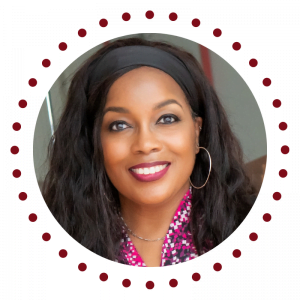
Want Karan to be Your Podcast Guest?
- Blended Workforces & the Gig Economy
- Critical Execution Tactics of High-performing Leaders
- Entrepreneurism & Leading Your Business

Want to be a Podcast Sponsor?
All sponsorships come with a featured spot on show notes pages.
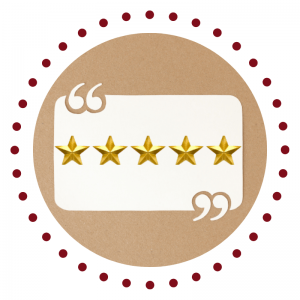
Like the Show? Please Leave a Review
If you like the show, it would mean the world to her if you left a quick review.
Your word is golden, so a HUGE thank you in advance!

#KeepInTouch
via our podcast alerts
Subscribe now to discover why thousands of monthly listeners who are passionate about doing their best work prioritize time each week to listen to the Blended Workforces @Work podcast.
#AboutSDL
#WhereToFindUs
MAILING
4480-H South Cobb Drive
PMB 219
Smyrna, GA 30080
PHYSICAL
2121 NewMarket Parkway
Ste. 108
Marietta, GA 30067
#ContactOptions
Customer Service Email:
service@shockinglydifferent.com
Call or Text:
770-384-1103
#Office Hours
MON-FRI
8:30 AM – 6:30 PM
Weekends By Appointment

